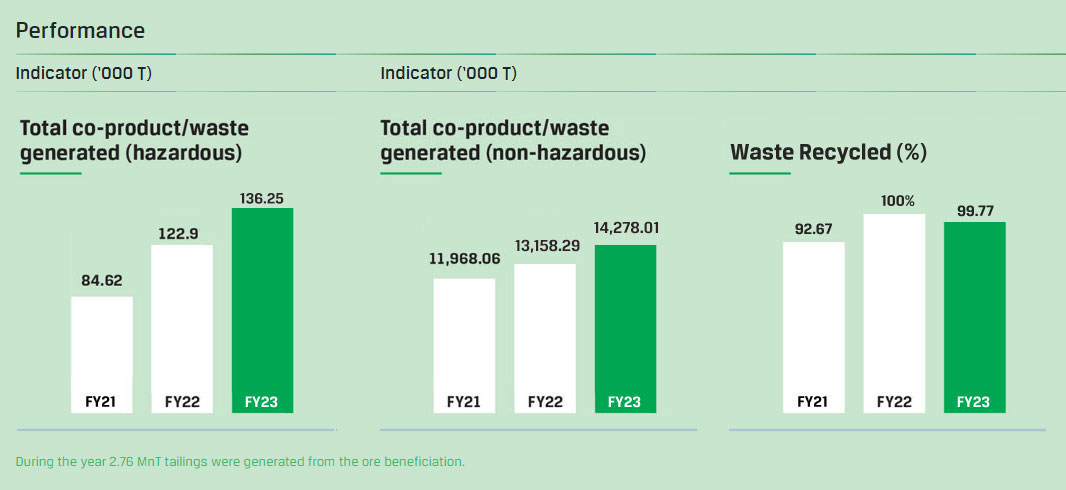Waste

Any activity undertaken by us, household or industrial activity, results in the production of waste. The solid waste generated is disposed off through dumping into landfills or incineration, but these methods are associated with negative effects on the environment. Such methods result in the land, air, and water pollution due to leaching of contamination along with associated emissions of carbon dioxide and methane that contribute to climate change and the local health impacts of emitted particulates. As a part of the efforts to deliver our Sustainability Vision, JSW Steel has committed to implement methods to prevent waste, reuse and recycle waste, and responsible disposal of waste. Managing waste in an environmentally friendly, socially responsible, and techno-commercially viable manner is of crucial importance in the steel manufacturing process. JSW Steel has an integrated strategy towards efficient waste management that ensures optimal utilization of resources and minimal disposal of solid waste.
SDG Mapping of JSW Steel’s Initiatives & Projects
SDG 15: Life on Land
- Life on land can only be healthy when waste is properly managed.
- JSW Steel has implemented innovations by leveraging the Company’s technological capabilities to eliminate the impacts of slag disposal.
- Due to the efforts of R&D to utilize EOF slag, JSW has been using it for paver block manufacturing and slag sand manufacturing. More details of the project can be found in Resource Framework
- JSW Steel is the only company in India using EOF slag (20%) as a coolant in EOF process. It is also used in sinter plant as a hearth layer (70%) to replace the raw material in smaller proportions.
- Dust from the bag filters and cyclones as well as filter cake are completely recycled in the sinter plant as they are iron bearing materials.
- Vijaynagar plant commissioned a 1 tonnes/day biogas plant based on the food waste as feed, which generates about 70-80 cubic-metre of biogas per day, almost equivalent to 35-40 kg of LPG.
- The Blast Furnace (BF) granulated slag is entirely sold to cement industries. Slag generated in the Energy Optimizing Furnace (EOF) is used in-house for road formation and is also sold to cement industries.
Green Cement
JSW Group, being a strategic first mover, has always proactively participated in envisioning and innovating systems to promote circular economy. The establishment of JSW Cement is an exemplification of a state-of-the-art concept of backward integration and synergic conglomeration. JSW Steel has a capacity of 18 million tonnes of crude steel production which generates around 7.2 million tonnes of slag. Traditionally, the steel companies used to dump the slag in landfills but JSW Steel uses it to make Green Cement which not only promotes circular economy, but also prevents dumping of slag and helps reduce the carbon footprint of JSW Steel.
The cement is more sustainable than its counter parts also because of the integrated waste management system which has been adopted by the cement manufacturing units to co-process coal with dry waste including plastics and bio-medical waste in their cement kilns. It is a model waste management plan to develop dry waste processing and in-turn help with waste management in the community along with partial reduction of coal consumption.
Through these technologies the PSC product of JSW Cement has the lowest carbon footprint in the world at only 325.14 GWP (Global Warming Potential in CO2 eq)
SDG 14: Life Below Water
- The proliferation of plastic has been devastating for the planet. Around 8 million tonnes of plastic is dumped in the ocean every year compromising the marine ecosystem.
- Proper disposal of plastic waste is a challenge in India due to mismanaged plastic waste management practices. In order to reduce the plastic footprint, JSW has taken a pledge to ban Single Use Plastic from its operations.
JSW Group – Single Use Plastic Ban
- Serving snacks steel boxes/ biodegradable paper along with wooden/steel cutlery instead of plastic pouches or plastic cutlery.
- Reuse of plastic bags in a nursery for growing saplings.
- Procurement of glass/steel water bottles to replace plastic bottles of the employees.
- Separate dustbins for plastic waste collection and use of plastic to make oil via pyrolysis.
- To control the plastic inflow into the organization, JSW even added a clause in its purchase order against usage of SUP as packaging.
- In October 2019, Mr. Sajjan Jindal, Chairman & MD – JSW Group, took the decision to reduce the plastic footprint of the company in order to take a step ahead in making the operations of JSW more sustainable. Through this, JSW has successfully built awareness among its employees and their families of the negative impacts of plastic on our environment and promoted the use of alternative sustainable materials. Many locations came up with innovative solutions to not only eliminate plastic but replace it with eco-friendly material. Some of such best practices adopted by JSW are,
As of now, all of JSW locations are Single Unit Plastic free, which means they are free of designated SUP by UNEP like plastic water bottles, plastic bags, and plastic cutlery.
Waste Generation and Utilization trends of JSW Steel

JSW discloses the sustainability related information in its integrated/sustainability reports which can be found here.
